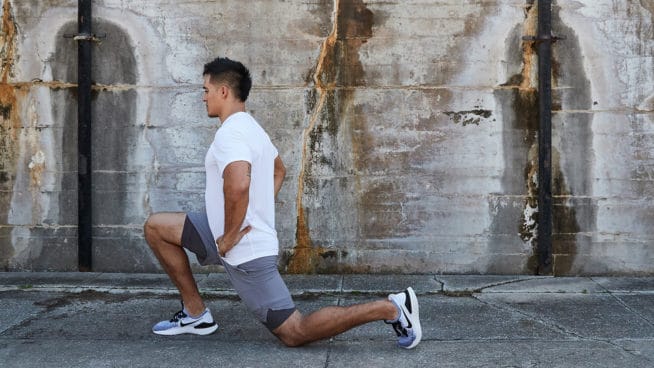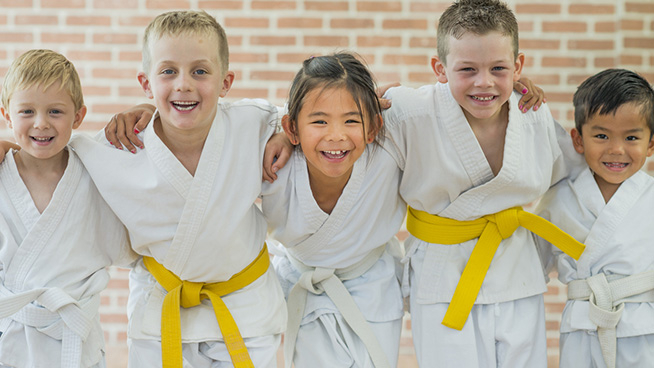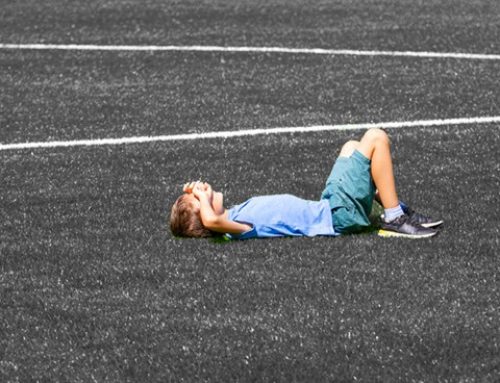Add Inches to Your Vertical Jump With This Offseason Plan
Almost all athletes aspire to increase their hops. It’s especially important for athletes who play basketball and volleyball, but regardless of the sport a higher vertical jump will help you perform better.
But this can be frustrating. Some of you might think you simply weren’t born with jumping skills, whereas others can practically leap through the ceiling. Yes, some people have serious hops, but that doesn’t mean you can’t train to add inches to your vert.
In the video below, watch what can happen when you can squat two times your body weight, have a great rate of force development and good hip mobility.
Fortunately, the solution is simple. Add the following three exercises to your training program this summer and watch your Vertical Jump explode.
1. Improve force production with Squats
The Squat is the No. 1 movement in all of my strength programs, including my basketball program. Athletes are built from the ground up. If you want to run fast and jump high, you must have a strong base, and that all starts with the Squat.
RELATED: Front Squat 101: How to Master The Move in 5 Minutes
The Squat has gotten a bad and undeserved reputation. Some basketball strength coaches and physical therapists believe that tall players should not squat because they cannot do it properly. When I say the Squat is the No. 1 movement in my strength program, I am not referring only to the Back Squat. Depending on your current level and movement capabilities, use a Front Squat, Goblet Squat or Dumbbell Squat or even a Bodyweight Squat. Additionally, I love to incorporate the Rear Foot-Elevated Split Squat in my athletes’ training programs.
Watch the video above to see the Squat variations I use in my programs.
Vertical jumping is a measure of power. The more an athlete can enhance his or her power, the greater their jumping ability will be. Force is a component of the power equation.
The Squat enhances force production during the hip and knee flexion and extensions, which are vital for jumping. Also, the Squat increases leg-strength-to-bodyweight ratio, an important component in the ability to accelerate, decelerate, produce power and elevate into the air.
Simply put, if you as an athlete want to jump higher, run faster, stop in less time and change direction quicker, you need the strength to produce more force. Squats have a direct effect on these attributes and the force needed to excel at them.
So start squatting and enjoy the benefits of improved athleticism!
2. Improve rate of force development with Olympic lifts
[youtube video=”DMqdoQwvOIA” /]To jump high and run fast, an athlete must be able to produce power. Power is the product of force times velocity. The velocity component is also referred to as the rate of force development. To be powerful, the goal is to produce a lot of force quickly.
The High Pull exercise involves triple extension of the hips, knees and ankles. This explosive move trains rate of force development to help you run faster and jump higher.
If you want to increase your vertical, increase your force output (strength) and your rate of force development. The High Pull is a great exercise to improve your rate of force development.
RELATED: Power Clean Variations for Strength and Power
3. Improve hip mobility
[youtube video=”2WBhlLWMLKg” /]Now we know that to be explosive and have a great vertical, an athlete must be able to produce a lot of force in a short amount of time. The third piece to being a great leaper is hip mobility.
Many athletes, especially basketball players, have tight hips. Tight hip flexors present a disadvantage for athletes working toward an impressive Vertical Jump. Tight hips can hinder an athlete’s use of his or her glutes. The glutes are one of the most important muscles for running fast and jumping high. In addition, tight hip flexors can prevent an athlete from being able to explode into triple extension. As noted in the High Pull, triple extension is what occurs when an athlete throws down an energetic dunk.
RELATED: Get Better Hip Mobility: 9 Stretches and Exercises
We have become a society that sits around all day—in school, at work, in front of the computer and watching TV. Because of this, the hip flexors have a tendency to become contracted and tight, almost pulling us into an anterior pelvic tilt.
Add these two simple hip stretches to your workout routine this offseason and gain the benefits of moving better and jumping higher!
If you want to become an explosive leaper, add the Squat, High Pull and hip mobility exercises to your workout program this summer and most importantly, work hard. Have a great summer. I hope to see you above the rim this fall!
[cf]skyword_tracking_tag[/cf]RECOMMENDED FOR YOU
MOST POPULAR
Add Inches to Your Vertical Jump With This Offseason Plan
Almost all athletes aspire to increase their hops. It’s especially important for athletes who play basketball and volleyball, but regardless of the sport a higher vertical jump will help you perform better.
But this can be frustrating. Some of you might think you simply weren’t born with jumping skills, whereas others can practically leap through the ceiling. Yes, some people have serious hops, but that doesn’t mean you can’t train to add inches to your vert.
In the video below, watch what can happen when you can squat two times your body weight, have a great rate of force development and good hip mobility.
Fortunately, the solution is simple. Add the following three exercises to your training program this summer and watch your Vertical Jump explode.
1. Improve force production with Squats
The Squat is the No. 1 movement in all of my strength programs, including my basketball program. Athletes are built from the ground up. If you want to run fast and jump high, you must have a strong base, and that all starts with the Squat.
RELATED: Front Squat 101: How to Master The Move in 5 Minutes
The Squat has gotten a bad and undeserved reputation. Some basketball strength coaches and physical therapists believe that tall players should not squat because they cannot do it properly. When I say the Squat is the No. 1 movement in my strength program, I am not referring only to the Back Squat. Depending on your current level and movement capabilities, use a Front Squat, Goblet Squat or Dumbbell Squat or even a Bodyweight Squat. Additionally, I love to incorporate the Rear Foot-Elevated Split Squat in my athletes’ training programs.
Watch the video above to see the Squat variations I use in my programs.
Vertical jumping is a measure of power. The more an athlete can enhance his or her power, the greater their jumping ability will be. Force is a component of the power equation.
The Squat enhances force production during the hip and knee flexion and extensions, which are vital for jumping. Also, the Squat increases leg-strength-to-bodyweight ratio, an important component in the ability to accelerate, decelerate, produce power and elevate into the air.
Simply put, if you as an athlete want to jump higher, run faster, stop in less time and change direction quicker, you need the strength to produce more force. Squats have a direct effect on these attributes and the force needed to excel at them.
So start squatting and enjoy the benefits of improved athleticism!
2. Improve rate of force development with Olympic lifts
[youtube video=”DMqdoQwvOIA” /]To jump high and run fast, an athlete must be able to produce power. Power is the product of force times velocity. The velocity component is also referred to as the rate of force development. To be powerful, the goal is to produce a lot of force quickly.
The High Pull exercise involves triple extension of the hips, knees and ankles. This explosive move trains rate of force development to help you run faster and jump higher.
If you want to increase your vertical, increase your force output (strength) and your rate of force development. The High Pull is a great exercise to improve your rate of force development.
RELATED: Power Clean Variations for Strength and Power
3. Improve hip mobility
[youtube video=”2WBhlLWMLKg” /]Now we know that to be explosive and have a great vertical, an athlete must be able to produce a lot of force in a short amount of time. The third piece to being a great leaper is hip mobility.
Many athletes, especially basketball players, have tight hips. Tight hip flexors present a disadvantage for athletes working toward an impressive Vertical Jump. Tight hips can hinder an athlete’s use of his or her glutes. The glutes are one of the most important muscles for running fast and jumping high. In addition, tight hip flexors can prevent an athlete from being able to explode into triple extension. As noted in the High Pull, triple extension is what occurs when an athlete throws down an energetic dunk.
RELATED: Get Better Hip Mobility: 9 Stretches and Exercises
We have become a society that sits around all day—in school, at work, in front of the computer and watching TV. Because of this, the hip flexors have a tendency to become contracted and tight, almost pulling us into an anterior pelvic tilt.
Add these two simple hip stretches to your workout routine this offseason and gain the benefits of moving better and jumping higher!
If you want to become an explosive leaper, add the Squat, High Pull and hip mobility exercises to your workout program this summer and most importantly, work hard. Have a great summer. I hope to see you above the rim this fall!
[cf]skyword_tracking_tag[/cf]











